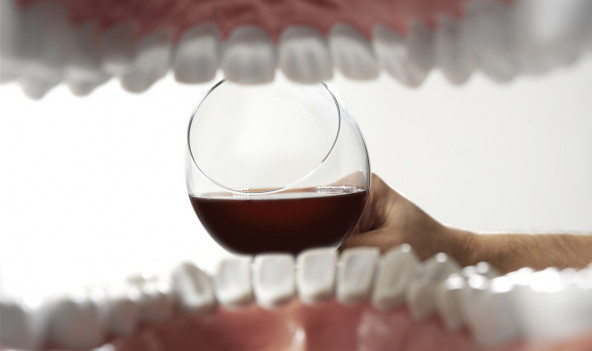As Australians, we love having a drink every now and then, and whilst many of us realise this can affect many aspects of our health, one thing that’s often overlooked is how it affects our dental health. Most people understand that smoking, eating lollies, drinking soft drinks, and lack of brushing can be detrimental to oral health – however many don’t consider the effects of alcohol, which deserves its own consideration.
Alcohol is like liquid sugar
Alcoholic fermentation is a biological process in which sugar is converted into alcohol (and carbon dioxide) – essentially meaning that every time you have an alcoholic drink, you’re covering your teeth in liquified sugar.
If you don’t rinse your mouth out with water and brush your teeth after drinking, you risk leaving this alcoholic sugar in your mouth which has other side effects include staining, dry mouth, and tooth decay.
Drinks higher in alcohol such as spirits can dehydrate your mouth. Healthy saliva is fundamental to oral health as it helps to remove bacterial plaque. A dry mouth is a breeding ground for bacteria that cause decay.
Further to this, bacteria in the mouth feed off sugar, so added sugar will lead to increased bacteria levels. These increased levels of bacteria left untreated can lead to gum disease or gingivitis. Not only that, but citrusy drinks (even a squeeze of lemon) is enough to break down the enamel on the teeth and cause cavities or tooth sensitivity.
Alcohol affects pH Balance
Most alcoholic beverages are highly acidic – i.e. have a low pH – the lower the pH, the worse it is for your teeth. Sugar also affects the pH balance of your mouth.
Consistently drinking sugary and acidic alcoholic beverages will cause the outer enamel on your teeth to erode and dissolve, which over time will lead to darker and more sensitive teeth.
Maintaining a neutral pH of 7, or close to it, is optimal for your mouth. Here’s a list of a few alcoholic beverages and their approximate pH for you to keep in mind the next time you’re at the bar with friends.
| Drink | pH |
| water | 7.0 |
| vodka | 6.0-7.0 |
| gin | 3.0-6.0 |
| carbonated water | 5.0-6.0 |
| ales | 3.0-6.0 |
| rum | 4.5-5.0 |
| barley malt lager beers | 4.0-5.0 |
| whiskey | 3.7-4.7 |
| red wine | 3.3-3.6 |
| white wine / champagne | 3.1-3.4 |
| tequila | 3.2 |
| sugary soft drink | 2.6 |
Nobody is likely to cut alcohol out of their lives over the above table, but perhaps reconsider your options.
Don’t get a Malibu and Coke: This is an absolutely terrible drink in regard to your teeth. This drink has a pH level of 2.5 and is loaded with tons of sugar. Perhaps opt for a Vodka Soda instead.
At the end of the day though, if you consume water and maintain oral health habits, and check in with your dentist regularly, it can help prevent any long term issues.
Drinking Alcohol with existing oral health problems
As discussed above, drinking alcohol and sugary drinks can lead to poor dental health – but what if you already have underlying dental health issues.
Alcohol and Tooth Infections:
A tooth infection occurs when bacteria attacks the gums and causes inflammation.
Alcohol can aggravate this inflammation, making it worse, or forcing it to last longer. The sugar in alcohol will feed the bacteria, and the acidity in alcohol can make your teeth and gums more sensitive during a tooth infection.
Alcohol and Gum Disease:
Gum disease is a serious dental condition. The early stage of gum disease is called Gingivitis, which is curable, but if left untreated can progress to Periodontitis, which is incurable.
Alcohol’s erosive properties are harmful to your teeth and can hinder efforts to fight against gum disease. The sugar in alcohol can cause even more infection, especially if you’re also experiencing receding gums because of gingivitis. As such, it’s best to do all you can to maintain a healthy mouth.
Alcohol and Broken/Cracked Teeth:
If you have broken or cracked teeth, you should limit your consumption of alcohol until they are replaced, or you have crowns or veneers put in place.
When teeth are cracked or broken, the enamel can no longer protect your roots and nerve endings from exposure. When you drink alcohol, it has easy access to the inside of your teeth and can begin breaking down the pulp and the root of your tooth.
Proper Dental Hygiene
High sugar content in lots of alcoholic drinks, as well as the acid in alcohol, can lead to tooth and gum problems. It’s also worth noting, that brushing your teeth immediately after drinking an acidic beverage (or reflux/vomiting) isn’t actually a good idea – it can be harmful to your teeth, as this is when they are soft and most likely sensitive – it’s best to first rinse thoroughly with water.
Drinking alcohol is something many of us do, but like anything, it’s all about moderation.
- Reduce episodes of binge drinking
- Drink water in between alcoholic drinks
- Floss regularly and brush twice a day
- See your dental professional for regular checks and cleans
Keep your smile healthy and strong by brushing and flossing every day and visiting your dentist at least twice a year.
Our professional, friendly staff will make your visit as comfortable and pleasant as possible in our relaxed and modern surroundings. Contact us today to book your appointment.
